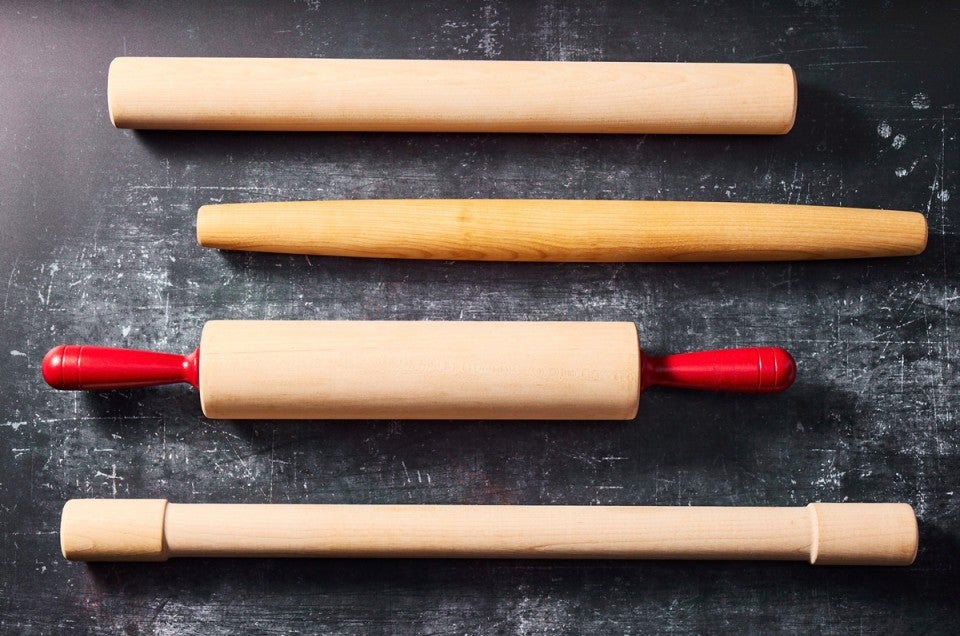


Rolling pins are essential baking tools, but their various styles can cause some confusion. Why are some tapered and others cylindrical? What materials are best? Do you need more than one?
Ultimately, the best rolling pin for you is the one you’re the most comfortable using. Some bakers swear by their grandmother’s wooden pin with handles, while others prefer the consistency of a straight pin. If you can roll out neat shapes of dough with an even thickness, that’s all that matters. With an understanding of good rolling technique, a baker can use almost any pin to achieve their goal.
However, different styles of rolling pins do have advantages for certain tasks, so I tested them to find where each shines. With each rolling pin, I rolled out batches of All-Butter Pie Crust to assess the pin’s ability to shape a tidy, even circle, Roll-Out Sugar Cookies to see how evenly it could roll dough to a specific thickness, and Blitz Puff Pastry to evaluate how the pin fared with a large volume of sticky dough rolled to specific dimensions.
Ahead of holiday pie and cookie baking season, here is a guide to our various rolling pins and how to choose the best one for your experience level and the project at hand.
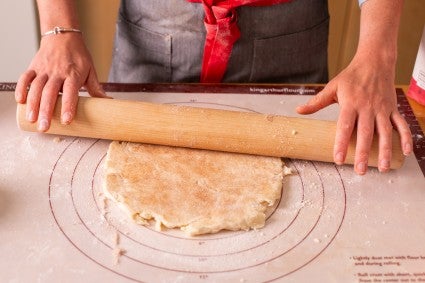
Shop: Straight Rolling Pin
For recipes that require flat, even dough in any thickness, and particularly for large-scale projects, reach for this straight rolling pin. This 19" long dowel-style pin performed well in each task in my testing, particularly excelling when rolling out a large batch of puff pastry to an 8" x 20" rectangle. Its lightly textured wooden surface held just enough flour to keep the dough from sticking, and its simple shape and even thickness of 2" made it easy to keep even pressure all over any kind of dough. Bonus: Its heft and blunt ends are also perfect for crushing pretzels or candies to include in your recipes.
This pin is a bit on the heavier and bulkier side, but if you only have room for one rolling pin in your baker's toolkit, this one is the most versatile.
Testing results:
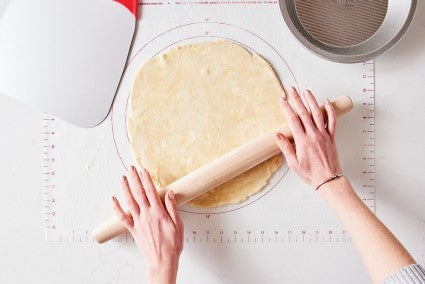
Shop: French Rolling Pin
This French-style rolling pin is slightly tapered at each end, allowing you to put more or less pressure on each side as you roll your dough, and it's a bit narrower than the straight pin, starting at 1" at the ends and 1 3/4" at the center. This makes it highly maneuverable and easy to swivel as you roll, allowing you to push the dough where you want it to go. In my testing, this pin yielded the neatest circle of pie dough, allowing me to easily maintain a round shape.
I was also able to get very even results during the cookie dough and puff pastry tests with this pin, but the doughs did stick a bit more across the board, and it may take some practice for less experienced bakers to get the hang of its design to achieve even thicknesses.
Testing results:
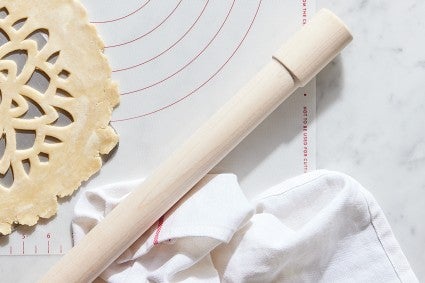
Shop: Uniform Pastry Pin 1/4 Inch
When you’re making roll-and-cut cookies, keeping the dough flat and even across its entire surface is a must. If the dough is thick in the center and thin at the edges, your stamped cookies will be of varying thickness; as a result, they’ll bake at different rates. To take all of the guesswork out of the equation, use this clever uniform pastry pin. The cylinders at each end keep the dowel exactly 1/4" above the work surface, which means your dough will be exactly 1/4" thick all the way around. The cookie dough I rolled with this pin was perfectly even and created very uniform cookies without any thin spots. It’s also a long pin — 18" in workable length! — so you can roll out a lot of dough at once.
Of course, this particular pin is only suited to recipes that call for dough that requires an exact 1/4" thickness (though we do also offer the same style of pin in an 1/8" depth). Because the dough will only get 1/4" thick, you're bound by the thickness, not the dimensions, of the dough. When rolling pie dough with this pin, I could not get the round to roll out to a 12" diameter — it stopped short at 9" when it reached its 1/4" thickness and would go no further. What's more, its ends got in the way when rolling puff pastry to dimensions larger than 18". It’s a specialized tool, but if you bake cookies often, it’s a helpful one to have in your arsenal.
Testing results:
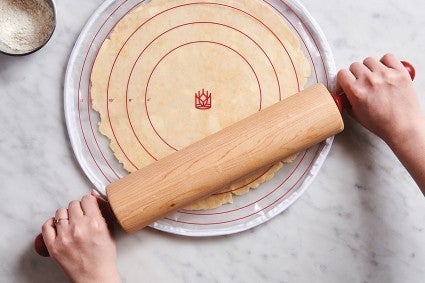
While the options above are excellent for most tasks, the best rolling pin is the one you’re most comfortable using. Many American bakers grew up learning to cook with a handle-style rolling pin like our Maple Rolling Pin and if you’re partial to that style, it’s another great choice! The handles are comfortable to hold, and it performed well during all three tests, with a little extra effort required when rolling back and forth.
You can find all of these pins and other handy baking tools in the King Arthur Shop.
Cover photo by Rick Holbrook; food styling by Kaitlin Wayne.

